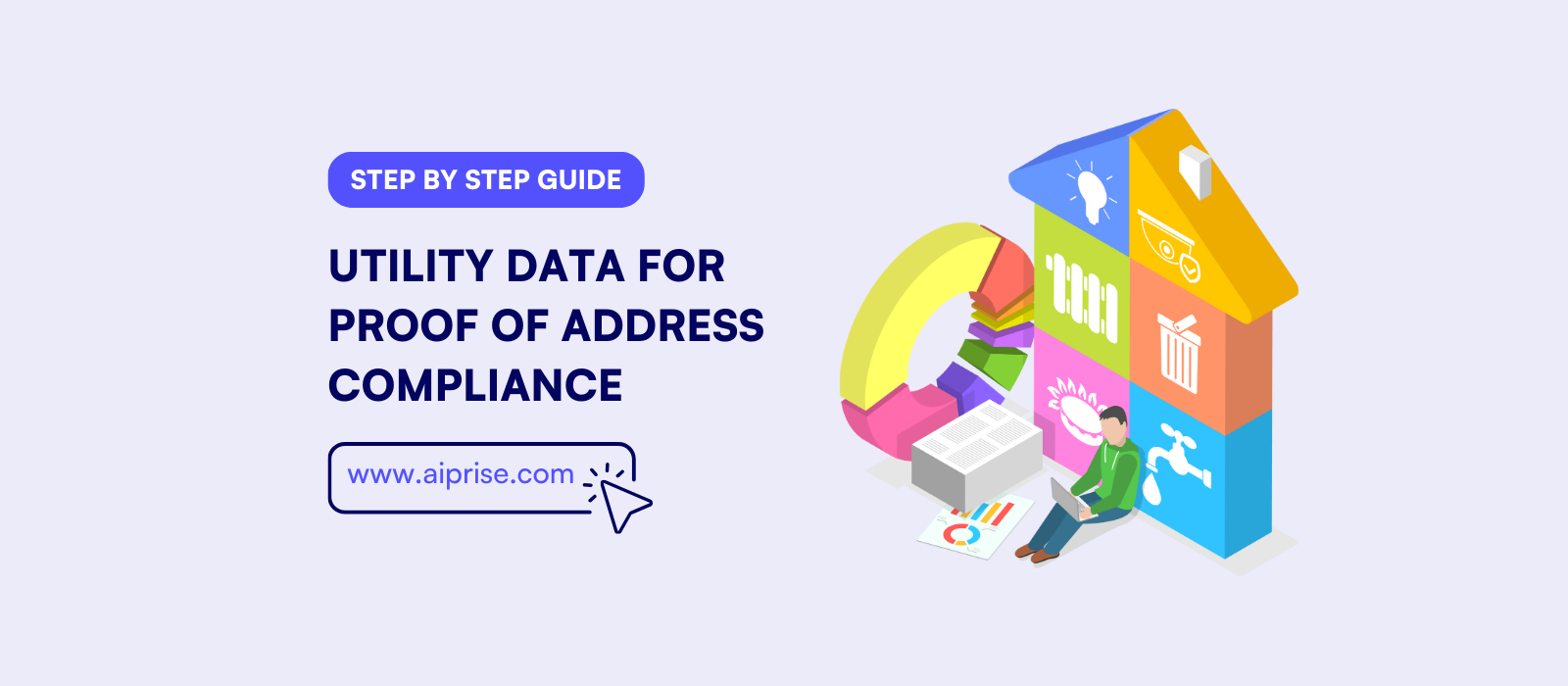AiPrise
4 min read
November 6, 2023
Utility data for proof of address compliance: A step-by-step guide

Introduction
Proof of address compliance is a critical component in various industries, including finance, healthcare, and e-commerce. It is a process that ensures individuals are who they claim to be, and their provided address is accurate and up-to-date. Utility data is used to proof address by comparing the information on the utility bill to the information provided by the individual or business. This guide explores the role of utility data in achieving proof of address compliance, its importance, and how it can be streamlined with automation.
What is Proof of Address Compliance?
Proof of address compliance is the process of verifying an individual's identity and confirming their residential address. Address verification is the process of confirming that an individual or business resides at a specific address. It is an important step in the Know Your Customer (KYC) process, which is used by businesses to verify the identity of their customers. It's a crucial step in preventing fraud, money laundering, and ensuring regulatory compliance. To achieve this, organizations require reliable methods to verify the accuracy of the address provided by the customer.
Types of Utility Data for Proof of Address Compliance
Utility data encompasses various documents that can serve as evidence of an individual's address. These documents may include:
Utility Bills: These can include gas, water, electricity, or telephone bills in the individual's name.
Bank Statements: Official bank statements that show the individual's address and financial history.
Government Correspondence: Letters or documents received from government entities, such as tax assessments or social security statements.
Rental Agreements: Lease agreements or rental contracts that confirm the residential address.
Property Tax Documents: Documents related to property ownership or property tax payments.
How is Utility Data Used for Proof of Address?
Organizations use utility data to cross-reference the address provided by an individual during the KYC process. They compare the address on the utility bill or other relevant documents with the address provided by the customer. If there is a match, it provides a level of assurance that the address is accurate and valid.
Why is Proof of Address Compliance Important for KYC?
KYC regulations are in place to combat financial crimes, such as money laundering and identity theft. Ensuring the accuracy of an individual's address is a fundamental aspect of KYC. Without proper address verification, organizations are at risk of facilitating illegal activities and may face regulatory penalties.
Industries Using Proof of Address Compliance
Numerous industries rely on proof of address compliance, including:
Financial Services: Banks, credit unions, and other financial institutions use address verification to open accounts, disburse loans, and prevent fraudulent transactions.
Healthcare: Medical facilities use address verification to confirm patient identities and ensure billing accuracy.
E-commerce: Online retailers use it to prevent fraudulent orders and verify customer addresses for accurate deliveries.
Traditional vs. Modern Methods
Traditionally, address verification involved manual checks, often leading to delays and inefficiencies. Modern methods leverage technology, such as AI and data analysis, to automate the process, making it faster and more accurate.
Traditional methods of address verification include manually:
Checking utility bills
Checking bank statements
Checking rental agreements
Checking government-issued identification
Modern methods of address verification include:
Using online address verification services
Using mobile apps
Using social media
How can it be automated?
Automating address verification streamlines the KYC process. Automation allows for real-time checks, reducing the chances of manual errors and ensuring compliance with regulatory requirements. Additionally, automated solutions are more efficient, providing a better customer experience. Address verification can be automated using a variety of methods, including:
Optical character recognition (OCR): OCR software can be used to scan utility bills and other documents to extract the relevant information.
Machine learning: Machine learning algorithms can be used to analyze utility data and other information to identify patterns and trends that can be used to verify addresses.
Artificial intelligence (AI): AI can be used to automate the entire address verification process, from scanning documents to extracting information to verifying addresses.
AiPrise and automated address verification
Aiprise is a leading provider of automated address verification solutions. Aiprise's solutions use AI and machine learning to automate the address verification process, making it faster, easier, and more accurate. By integrating advanced technology, AiPrise helps organizations streamline the KYC process by verifying customer addresses in real time, thus improving accuracy and efficiency.
Book a Demo to Find Out More
To explore how AiPrise can benefit your organization with automated address verification, book a demo today. Discover how our solution can enhance your KYC process, reduce fraud risks, and provide a more seamless experience for your customers.
You might want to read these...

Aiprise has helped streamline our KYB (Know Your Business) flow in 100+ countries. No other tool comes close.





Speed Up Your Compliance by 10x
Automate your compliance processes with AiPrise and focus on growing your business.





